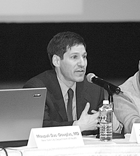Some verbal-consent proponents say ’97 bill requiring newborn testing proves case
Some proponents of ending written consent for HIV testing have cited what they say is the success in reducing mother-to-child HIV transmission that resulted from the so-called baby AIDS bill, a 1997 state law that required the testing of newborns.
But the greatest declines in mother-to-child transmission in New York came before that law was enacted and at a time when doctors were required to obtain written consent and provide pre- and post-test HIV counseling.
“That means that integrating HIV testing into routine care, along with pre- and post-test counseling, along with written consent, is not a barrier to people opting to test,” said Tracy L. Welsh, executive director of the HIV Law Project, one of a number of AIDS and gay groups that oppose ending written consent for HIV testing.
Dr. Thomas R. Frieden, New York City’s health commissioner, has proposed changing state law to end the requirement for written consent and allow HIV testing after a patient gives verbal consent. Frieden and other supporters have argued that doctors do not provide HIV tests because they find the written consent requirement burdensome.
The state requirement for pre-test counseling was changed in 2005 so that a provider can simply give the patient a pamphlet, as opposed to providing verbal counseling. Ending written consent and reducing the counseling will result in more people being tested for HIV and make it part of routine medical care, proponents argue. Some backers—though not Frieden—have pointed to the results of the baby AIDS bill to justify their support.
Beginning in 1987, New York State began anonymously testing newborns for HIV. The baby AIDS bill “unblinded” those test results and pregnant mothers were told that their baby would be tested even if they chose not to test.
According to state health department data, between 1997, when the baby AIDS law was implemented, and 2004, the latest year for which data is available, cases of mother-to-child transmission fell from 89 to 10, an 89 percent decline. Such cases fell from 337 in 1990 to 89 in 1997, a 74 percent decline, but a much larger drop in actual cases.
Welsh said the declines were due to HIV-positive mothers giving birth by caesarean section, taking anti-HIV drugs prior to giving birth, and avoiding breastfeeding, actions HIV-positive mothers took while verbal pre-test counseling and written consent was in place. Those preventative practices became standard across the country in the early ’90s and, nationally, mother-to-child cases fell 75 percent between 1992 and 1998, according to the federal Centers for Disease Control and Prevention.
“The reduction of mother-to-child transmission has had more to do with the advent of knowledge around HIV and women given the opportunity to voluntarily test,” Welsh said.
Speaking at forums on the proposed changes organized by the city health department, a number of Frieden supporters have cited the baby AIDS bill. They include Dennis deLeon, president of the Latino Commission on AIDS, and Dr. M. Monica Sweeney, vice president of medical affairs at the Bedford Stuyvesant Family Health Center and a member of the Presidential Advisory Council on HIV/AIDS. Sweeney did not respond to a call seeking comment.
In a June 12 interview, deLeon said he “misspoke” when he said he regretted opposing the baby AIDS bill during an April 4 forum. Because newborns are typically infected by their mother, testing the baby without a parent’s consent is effectively mandatory testing of the mother and deLeon said he opposed mandatory testing.
“That’s working,” deLeon said of the declines in mother-to-child transmission. “What we’re not doing is offering the test to people in general who are in the hospital.”
Cutting mother-to-child transmission worked because it was done with a smaller population, deLeon said.
“You can do that with a finite number of people,” he said. “The doctors had more time with the women. It was integrated into the care for the women.”
Written consent would interfere with the tens of thousands of tests that are needed to identify the estimated 20,000 New York City residents who are infected, but do not know it, deLeon said.
“You’re talking about a much larger scale of testing,” he said. “We’re talking about 20,000 unknown HIV cases. We’re talking testing hundreds of thousands of people.”
Welsh said that there are roughly 250,000 women who give birth in the state very year.
“It may be thousands of people that we’re trying to reach, but when we’re testing it’s still one person with one provider,” she said.
Peter Staley, a longtime AIDS activist, cited the baby AIDS bill in a June 2 editorial supporting Frieden that was published in the New York Times.
In an interview, Staley said he was only citing the arguments made against the baby AIDS bill, such as women will avoid pre-natal care or kill themselves upon learning they are positive, if the bill was implemented.
“Neither of those predictions have come to pass,” he said.
Some of those same arguments are being used against the Frieden proposal.
“One of the arguments used against Frieden’s current proposals is that the lifting of the requirement for consent will scare people away from healthcare settings because they will supposedly be scared that they will be tested against their will,” Staley said. “The problem I get with the AIDS establishment is they make these the sky-is-falling arguments.”
Frieden’s proposal has “the potential to increase testing and it has no downside,” Staley said.
Assembywoman Nettie Mayersohn, the Queens Democrat who championed the baby AIDS bill and backs the Frieden proposal, said the bill resulted in more HIV-exposed babies being identified and referred to care.
“They were getting about 40 percent of the mothers,” she said. “We’re now getting about 99 percent, close to 100 percent, of the mothers and babies into treatment.”
While she cited state health department data to make her point, Mayersohn said of the state data showing the largest declines in mother-to-child transmission before her bill was implemented, “I don’t believe your statistics.”
gaycitynews.com




































